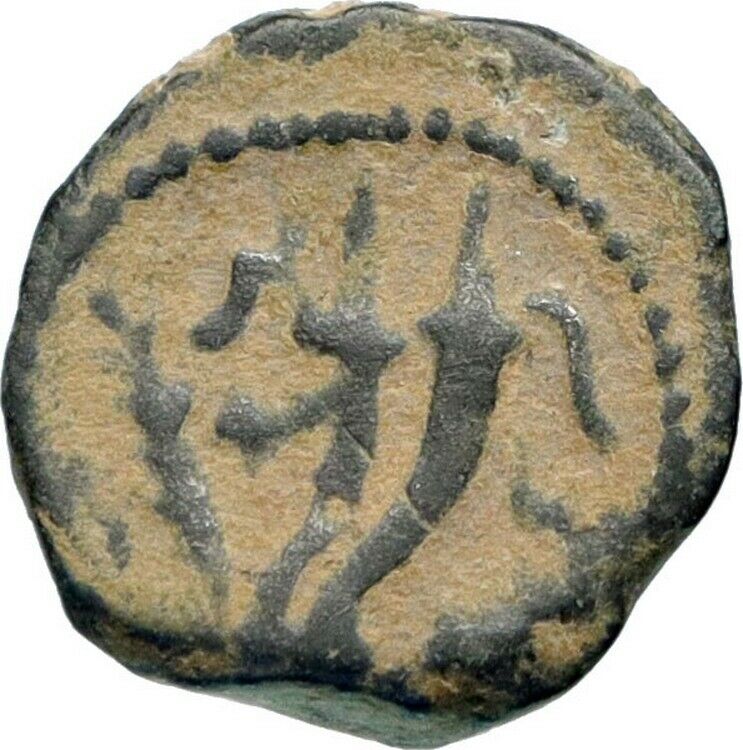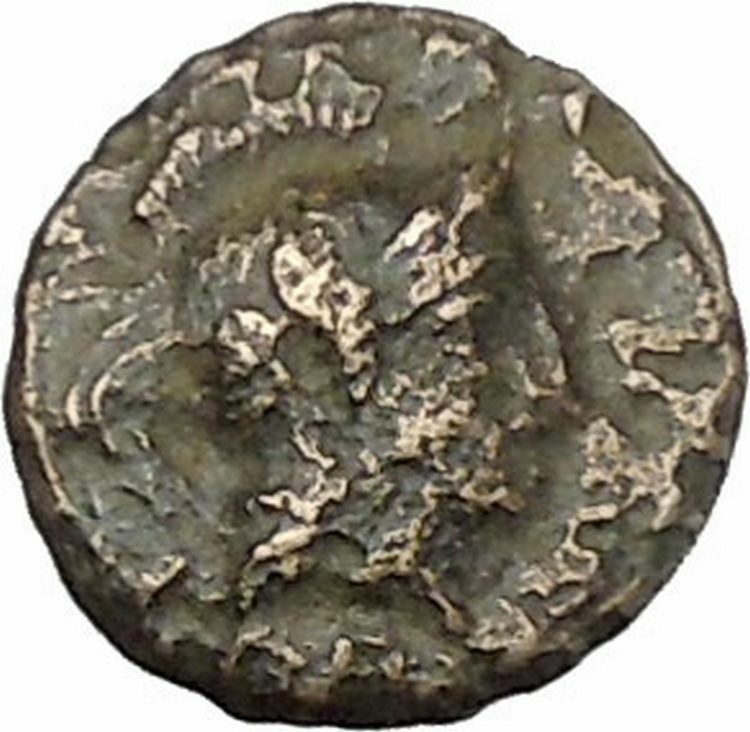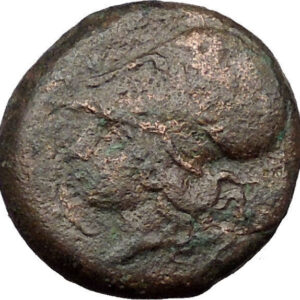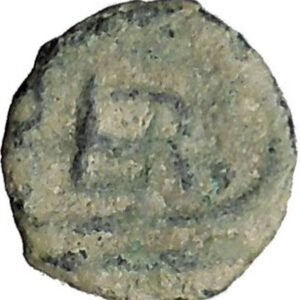|
Seleucid Kindom
Demetrios II, Nikator – King:
145-140 B.C.
Serrate
Bronze 15mm (2.79 grams) Struck 145-140 B.C.
Reference: Sear 7069; B.M.C. 4.61,28
His diademed head right.
ΒΑΣΙΛΕΩΣ / ΔΗΜΗTPIOY
either side of Demeter standing facing, holding long torch.
King Demetrios II, Nikator of the Seleucid Kingdom,
first reign, 145-140 B.C. – The elder son of Demetrios I, he managed to
overthrow Alexander Balas with the assistance of Ptolemy of Egypt. His hold on
the throne was, however, precarious and his rule was mostly confined to the
cities of the Phoenician coast. In 140 B.C., he marched against the Parthians,
but was captured by them and remained in honorable captivity at the Arsacid
court for the following decade.
You are bidding on the exact item pictured,
provided with a Certificate of Authenticity and Lifetime Guarantee of
Authenticity.

In
Greek mythology
, Demeter (ancient
Greek Δημήτη�, Dēmētēr)
was the goddess of the harvest, who presided over
grains
, the
fertility
of the earth, the
seasons
(personified by the
Hours
), and the
harvest
. One of her surnames is Sito (σίτος:
wheat) as the giver of food or corn. Though Demeter is often described simply as
the goddess of the harvest, she presided also over the sanctity of
marriage
, the
sacred law
, and the cycle of
life and death
. She and her daughter
Persephone
were the central figures of the
Eleusinian Mysteries
that also predated the
Olympian pantheon.
Her
Roman
cognate is
Ceres
.
Demetrius II (Greek:
Δημήτ�ιος Β` d.
125 BCE
), called Nicator (Greek:
“Î�ικάτωÏ�”, i.e. “Victor”), was the middle son of
Demetrius I Soter
. He ruled the Seleucid Empire for two periods, separated
by a number of years of captivity in Parthia.
In Exile
As a young boy, he fled to
Crete
after the
death of his father, his mother and his older brother, when
Alexander Balas
usurped the
Seleucid
throne.
First Reign
About
147 BCE
he returned to Syria, and with the backing of
Ptolemy VI Philometor
, king of Egypt, regained his father’s throne. The
Egyptian king also divorced his daughter
Cleopatra Thea
from Balas and remarried her to Demetrius.
[1]
Alexander fled to the Nabateans who, anxious to stay on good terms with Egypt,
cut off his head.
However, Demetrius was not a popular king. The people of Syria had little
respect for the young boy, who had come to power with the help of Egypt and
Cretan mercenaries led by the ruthless condottiere Lasthenes. The Antiochenians
offered the Seleucid throne to Ptolemy VI, who had already conquered most of
southern Syria for his own interest. However, he insisted Demetrius would become
king, knowing that Rome would never tolerate a unified Hellenistic state, and
the year after Ptolemy VI was killed when Alexander Balas made a last desperate
attempt to regain his throne. The Egyptian troops marched home, leaderless and
disillusioned, and with Balas dead as well Demetrius became sole master of the
Seleucid kingdom.
But new troubles soon arose. The pillaging of the Cretan soldiers caused the
Antiochenians to rise in rebellion, and only after terrible massacres was order
restored. Soon after, the general
Diodotus
conquered Antioch and had his protegé
Antiochus VI Dionysus
, the infant son of Alexander Balas, proclaimed king.
Demetrius proved unable to retake the capital, instead establishing himself in
Seleucia. Diodotus had Antiochus VI deposed a few years later, and made himself
King as Tryphon, but the division of the kingdom between the legitimate Seleucid
heir and the usurper in Antioch persisted.
Defeat and captivity
In
139 BCE
Parthian activity forced Demetrius to take action. He marched
against
Mithradates I
, king of
Parthia
and
was initially successful, but was defeated in the Iranian mountains and taken
prisoner the following year. The Babylonian province of the Seleucid empire
became Parthian, but in Syria was the dynasty’s grip was reassured under
Antiochus VII Sidetes
, the younger brother of Demetrius, who also married
Cleopatra Thea.
King Mithradates had kept Demetrius II alive and even married him to a
Parthian princess named
Rhodogune
,
with whom he had children. However, Demetrius was restless and twice tried to
escape from his exile on the shores of the Caspian sea, once with the help of
his friend Kallimander, who had gone to great lengths to rescue the king: he had
travelled incognito through Babylonia and Parthia. When the two friends were
captured, the Parthian king did not punish Kallimander but rewarded him for his
fidelity to Demetrius. The second time Demetrius was captured when he tried to
escape, Mithradates humiliated him by giving him a golden set of dice, thus
hinting that Demetrius II was a restless child who needed toys. It was however
for political reasons that the Parthians treated Demetrius II kindly.
In
130 BCE
Antiochus Sidetes felt secure enough to march against Parthia, and
scored massive initial successes. Now
Phraates II
made what he thought was a powerful move: he released Demetrius,
hoping that the two brothers would start a civil war. However, Sidetes was
defeated soon after his brother’s release and never met him. Phraates II set
people to pursue Demetrius, but he managed to safely return home to Syria and
regained his throne and his queen as well.
A failed second reign
However, the Seleucid kingdom was now but a shadow of its former glory, and
Demetrius had a hard time ruling even in Syria. Recollections of his cruelties
and vices – along with his humiliating defeat – caused him to be greatly
detested. The Egyptian queen
Cleopatra II
set up an army for Demetrius, hoping to engage him in her civil
wars against her brother king
Ptolemy VIII
, but this only added to his grief. The troops soon deserted,
and king Ptolemy VIII reacted by setting up yet another usurper, a man named
Alexander II Zabinas
against Demetrius.
In
126 BCE
Demetrius was defeated in a battle at
Damascus
.
He fled to Ptolemais but his wife
Cleopatra Thea
closed the gates against him.[2]
He was killed on a ship near
Tyre
, after his wife had deserted him. His miserable death – he was captured
and possibly tortured – was a fitting epitaph to the many shortcomings of his
reign. Demetrius II was certainly incapable of handling the developing threats
to the Seleucid empire, but his reputation for cruelty was probably undeserved.
He was only around fourteen at his coronation, and the real power was in the
hands of others.
He was succeeded by his queen Cleopatra Thea and then by two of their sons,
Seleucus V Philometor
and
Antiochus VIII Grypus
.
|









